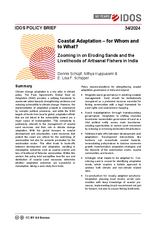Policy Brief
Coastal adaptation – for whom and to what? Zooming in on eroding sands and the livelihoods of artisanal fishers in India
Schüpf, Dennis / Nithya Kuppusami / E. Lisa F. SchipperPolicy Brief (34/2024)
Bonn: German Institute of Development and Sustainability (IDOS)
DOI: https://doi.org/10.23661/ipb34.2024
Climate change adaptation is a key pillar in climate policy. The Paris Agreement’s Global Goal on Adaptation (GGA) provides a unifying framework to accelerate action towards strengthening resilience and reducing vulnerability to climate change. However, the implementation of adaptation projects is constrained by complex political processes, and while the GGA targets all levels from local to global, adaptation efforts that are not linked to the vulnerability context are a major cause of maladaptation. This complexity is particularly relevant to the management of coastal sand resources and their role in climate change adaptation. With the global increase in coastal development and urbanisation, sand resources that protect the coast are critical for the well-being of communities but also for concrete production for the construction sector. This often leads to trade-offs between development and adaptation, resulting in maladaptive outcomes such as coastal erosion and loss of livelihood of fisheries communities. Within this context, this policy brief exemplifies how the use and distribution of coastal sand resources determine whether adaptation outcomes are successful or maladaptive, taking a case study from India.
Policy recommendations for strengthening coastal adaptation governance in India and beyond
• Integrate sand governance in existing coastal management: Sand should be institutionally recognised as a protected resource essential for fishing communities with a legal framework for sand rights and coastal zone mapping.
• Avoid maladaptation through transboundary governance: Adaptation to shifting shoreline boundaries necessitates governance of sand as a vital political entity across state boundaries, creating opportunities to restore sand movement by reducing or removing obstructive infrastructure.
• Address trade-offs between development and adaptation: Development interventions like harbours can exacerbate coastal hazards, necessitating policymakers to balance economic growth, transformative adaptation strategies and the interests of the construction sector, coastal communities and tourism.
• Untangle what needs to be adapted to: Con-sidering sand is crucial for identifying adaptation needs, which requires a holistic approach to address both climate and non-climate related risks.
• Co-production for locally adapted solutions: Adaptation planning must involve at-risk com-munities with deep knowledge of coastal pro-cesses, implementing beach nourishment not just for tourism, but also to secure fishing livelihoods.
Contact
Cornelia Hornschild
Publication Coordinator
E-mail Cornelia.Hornschild@idos-research.de
Phone +49 (0)228 94927-135
Fax +49 (0)228 94927-130
Alexandra Fante
Librarian/ Open Access Coordinator
E-Mail Alexandra.Fante@idos-research.de
Telefon +49 (0)228 94927-321
Fax +49 (0)228 94927-130




![[Translate to English:] Photo: Alexandra Fante, Bibliothekarin/Open Access-Koordinatorin](/fileadmin/_processed_/f/0/csm__c_Deutsches-Institut-fuer-Entwicklungspolitik_Fante_94ce4fa1ba.jpg)